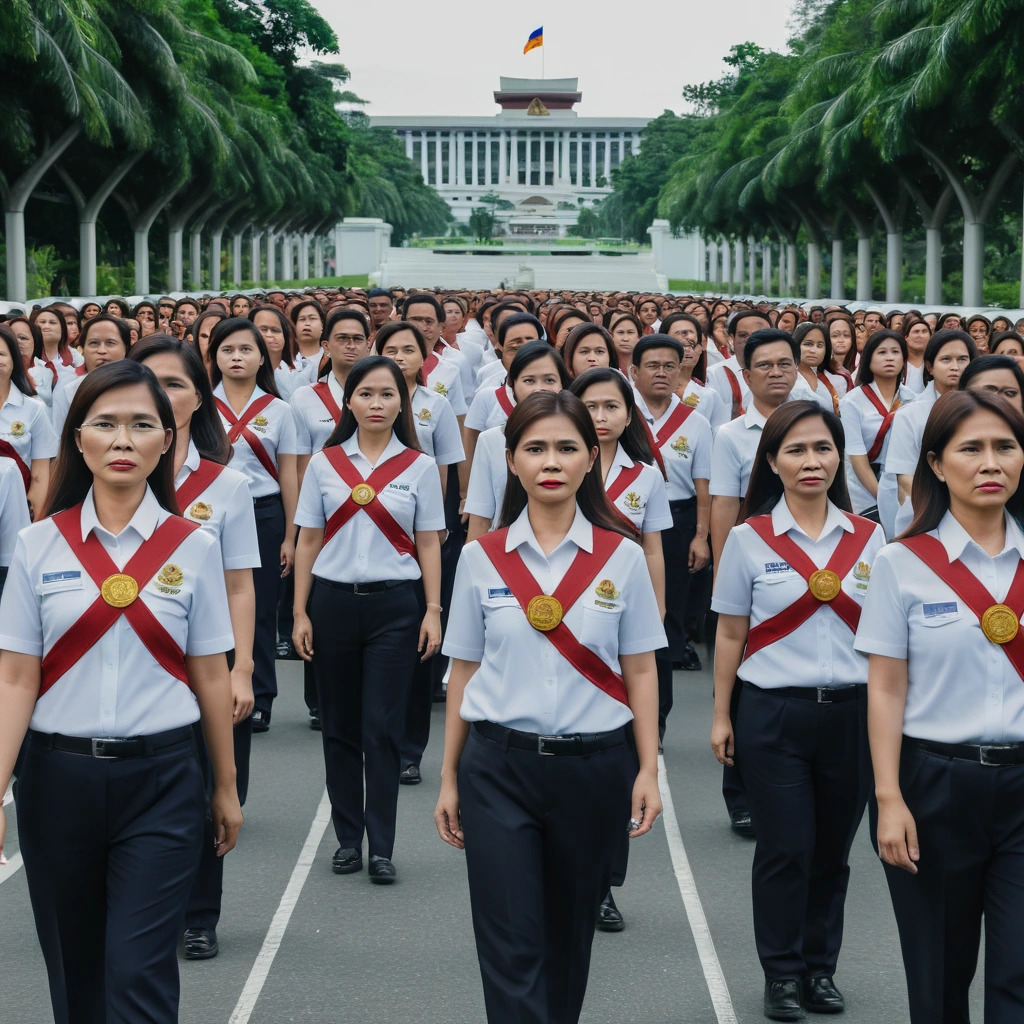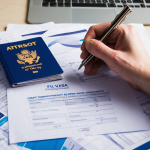Safeguarding the Sacrifices: An Analysis of Philippine Government Programs for OFWs
Introduction: The Promise and Peril of Overseas Employment
The Philippines, a nation deeply intertwined with the global diaspora, relies heavily on the remittances of its Overseas Filipino Workers (OFWs). These modern-day heroes contribute significantly to the national economy, yet their journeys are often fraught with challenges. The Philippine government, through agencies like the Philippine Overseas Employment Administration (POEA) and the Overseas Workers Welfare Administration (OWWA), plays a crucial role in safeguarding the rights and welfare of these workers. But how effective are these programs in reality?
This article delves into a comprehensive analysis of the government’s efforts, examining their impact on OFW deployment, protection against illegal recruitment, access to legal assistance, and reintegration support, while also addressing persistent challenges and offering data-driven recommendations for improvement. For many Overseas Filipino Workers, the promise of higher wages and improved living conditions abroad is a powerful draw, fueling labor migration trends that have shaped the Philippine economy for decades. Remittances from OFWs consistently bolster the nation’s GDP, providing crucial support to families and communities.
However, this pursuit of economic opportunity often comes at a steep price, with OFWs facing exploitation, abuse, and legal vulnerabilities in foreign lands. The Philippine government, therefore, bears a significant responsibility to ensure the ethical and safe deployment of its citizens, upholding OFW rights and providing comprehensive support throughout their employment cycle. Understanding the landscape of OFW employment opportunities is paramount. While certain sectors, such as healthcare and domestic work, have historically been dominant, emerging markets and evolving skill requirements are creating new avenues for Overseas Filipino Workers.
The Philippine government, through the POEA, actively negotiates bilateral labor agreements with host countries to secure better terms and conditions for OFWs. However, the effectiveness of these agreements hinges on rigorous enforcement and proactive monitoring to prevent illegal recruitment practices and ensure fair treatment of workers. Furthermore, equipping OFWs with the necessary skills and training to meet the demands of these evolving job markets is crucial for maximizing their earning potential and long-term career prospects.
Addressing the financial literacy of OFWs before, during, and after their employment contracts is also vital to ensure long-term financial security and prevent the squandering of hard-earned remittances. The complexities of labor migration demand a multi-faceted approach to OFW welfare. Beyond deployment and employment, the Philippine government must prioritize access to legal assistance for OFWs facing disputes or legal challenges abroad. Many Overseas Filipino Workers are unaware of their rights or lack the resources to navigate complex legal systems in foreign countries.
Strengthening embassy support and establishing readily accessible legal aid programs are essential steps in bridging this gap. Moreover, reintegration support for returning OFWs is crucial for ensuring a smooth transition back into Philippine society. Providing livelihood training, financial literacy programs, and access to capital can empower returning OFWs to build sustainable futures and contribute to the nation’s economic growth, transforming their overseas experiences into lasting benefits for themselves and their communities. The ultimate goal is to safeguard the sacrifices of Overseas Filipino Workers and ensure that their contributions are recognized and valued.
Deployment and Protection: POEA’s Regulatory Role and the Fight Against Illegal Recruitment
The Philippine Overseas Employment Administration (POEA) serves as the primary regulatory body overseeing the deployment of Overseas Filipino Workers (OFWs), tasked with ensuring that labor migration occurs through legal channels and adheres to both Philippine labor laws and international standards. This includes verifying employment contracts, accrediting foreign employers, and prosecuting illegal recruiters. The POEA’s mandate is crucial in safeguarding OFW rights from the outset, aiming to prevent exploitation and ensure fair labor practices. Complementing the POEA’s regulatory role, the Overseas Workers Welfare Administration (OWWA) provides a safety net of welfare services to OFWs and their families, encompassing insurance coverage, skills training programs designed to enhance employability, and comprehensive reintegration programs to support their return to the Philippines.
These two agencies form the cornerstone of the Philippine government’s efforts to protect and support its overseas workforce. Despite the POEA’s efforts to streamline deployment processes and combat illegal recruitment, the lure of overseas employment continues to attract unscrupulous individuals who prey on vulnerable Filipinos. Recent cases highlight the persistent challenges in eradicating illegal recruitment, demonstrating the need for constant vigilance and improved enforcement mechanisms. The closure of an alleged illegal recruitment agency in San Fernando, Pampanga, following an entrapment operation, as reported by GMA News, underscores the ongoing threat.
Similarly, the arrest of veteran broadcaster Jay Sonza in connection with alleged estafa and syndicated illegal recruitment, as reported by the Bureau of Jail Management and Penology (BJMP), serves as a stark reminder of the complexity and pervasiveness of this issue. These incidents highlight the critical need for increased public awareness campaigns to educate potential OFWs about the risks of illegal recruitment and the importance of verifying the legitimacy of recruitment agencies through the POEA.
To bolster the Philippine government’s support programs for Overseas Filipino Workers, a multi-faceted approach is essential, incorporating stringent penalties for illegal recruiters, enhanced international cooperation, and proactive measures to address the root causes of vulnerability to exploitation. Strengthening collaboration with foreign governments and international organizations can facilitate the sharing of information and best practices in combating human trafficking and labor exploitation. Furthermore, investing in skills development and livelihood opportunities within the Philippines can reduce the economic pressure that drives Filipinos to seek overseas employment through irregular channels. By addressing both the supply and demand sides of illegal recruitment, the Philippine government can more effectively protect its citizens and uphold their rights in the global labor market. Moreover, expanding access to legal assistance for OFWs facing disputes abroad is crucial, ensuring they receive fair representation and protection under the laws of their host countries.
Legal Assistance and Embassy Support: Bridging the Gap for OFWs in Distress
Access to legal assistance is a critical component of OFW protection, particularly when workers face disputes with employers or encounter legal problems in their host countries. Both POEA and OWWA offer legal assistance programs, but their effectiveness is often hampered by bureaucratic inefficiencies and limited resources. Many OFWs are unaware of their rights or how to access these services, and language barriers and cultural differences can further complicate matters. The perspective of embassy policies on worker assistance is also crucial.
Embassies often serve as the first point of contact for OFWs in distress, providing consular services and coordinating with local authorities. However, the level of support can vary significantly depending on the embassy’s resources and priorities. Case studies reveal instances where embassies have been instrumental in resolving labor disputes and securing the release of detained OFWs, while others highlight instances where workers have felt abandoned or underserved. A more proactive and coordinated approach, involving closer collaboration between POEA, OWWA, and Philippine embassies, is needed to ensure that all OFWs have access to timely and effective legal assistance.
Beyond the fundamental right to legal counsel, the Philippine government’s support programs for Overseas Filipino Workers must address the systemic vulnerabilities that lead to legal entanglements. Illegal recruitment remains a pervasive threat, often trapping unsuspecting OFWs in exploitative labor situations where their OFW rights are routinely violated. Strengthening pre-departure orientation seminars (PDOS) mandated by POEA is paramount. These seminars should not only cover basic legal rights but also equip prospective OFWs with practical strategies for identifying and avoiding fraudulent recruiters.
Furthermore, increased collaboration with local government units (LGUs) is essential to combat illegal recruitment at the grassroots level, empowering communities to report suspicious activities and protect vulnerable individuals from falling prey to unscrupulous actors. Successfully combating illegal recruitment directly reduces the need for reactive legal interventions. Financial literacy also plays a crucial role in mitigating legal challenges faced by OFWs. Poor financial management can lead to disputes with employers over unpaid wages or withheld benefits, as OFWs may lack the resources or knowledge to effectively negotiate their contracts or pursue legal remedies.
OWWA’s reintegration programs should incorporate comprehensive financial literacy modules tailored to the specific needs of OFWs in different sectors and regions. These modules should cover topics such as budgeting, saving, investing, and debt management, empowering OFWs to make informed financial decisions and avoid situations that could lead to legal complications. Moreover, access to affordable and reliable remittance services is crucial to ensure that OFWs can securely send money home to their families without being exploited by predatory intermediaries.
To enhance the effectiveness of legal assistance programs, the Philippine government should invest in expanding the capacity of its legal attachés stationed at Philippine embassies and consulates abroad. These legal attachés serve as crucial intermediaries between OFWs and the local legal systems in their host countries, providing legal advice, representation, and support. Increasing the number of legal attachés and providing them with specialized training in international labor law and human rights would significantly improve the quality and accessibility of legal assistance available to OFWs. Furthermore, establishing a dedicated OFW legal assistance hotline, staffed by qualified lawyers and paralegals, would provide OFWs with a readily accessible source of information and support, regardless of their location. This hotline could also serve as a valuable tool for monitoring and addressing emerging legal challenges faced by the Overseas Filipino Workers community.
Reintegration Support: Building a Sustainable Future for Returning OFWs
Reintegration support is essential to ensure that OFWs can successfully transition back to life in the Philippines after years of working abroad. OWWA offers various reintegration programs, including livelihood training, financial literacy seminars, and access to loans for starting small businesses. However, the impact of these programs is often limited by the lack of comprehensive support services and the challenges of adapting to a different economic environment. Many OFWs struggle to find suitable employment or start successful businesses, and some end up returning overseas due to financial pressures.
Furthermore, the social and psychological challenges of reintegration are often overlooked. OFWs may experience difficulty readjusting to family life, coping with feelings of isolation, or managing the expectations of their families. A more holistic approach to reintegration, addressing both the economic and social-emotional needs of OFWs, is needed to ensure their long-term well-being. This could include providing access to mental health services, offering family counseling, and promoting community-based support networks. One critical area often neglected is the alignment of reintegration programs with actual OFW employment opportunities available in the Philippines.
Livelihood training, while well-intentioned, may not always equip returning Overseas Filipino Workers with skills that are in high demand locally. The Philippine government, in collaboration with the POEA and private sector employers, should conduct thorough labor market analyses to identify sectors with growth potential and tailor training programs accordingly. For instance, focusing on skills relevant to the burgeoning BPO industry or the tourism sector could provide more sustainable employment pathways for returning OFWs. This proactive approach ensures that reintegration efforts directly translate into meaningful economic opportunities, reducing the likelihood of re-migration.
Financial management training is another cornerstone of successful reintegration, yet its effectiveness hinges on practical application and ongoing support. Many OFWs, despite attending financial literacy seminars, struggle to translate theoretical knowledge into sound investment decisions. OWWA could enhance its programs by providing access to financial advisors who can offer personalized guidance on budgeting, saving, and investing. Furthermore, the government should explore partnerships with reputable financial institutions to offer tailored financial products and services specifically designed for returning OFWs.
These initiatives should also incorporate safeguards against predatory lending practices and investment scams, which often target vulnerable OFWs. By empowering OFWs with the knowledge and resources to manage their finances effectively, the Philippine government can help them build a secure financial future. Beyond economic considerations, addressing the psychological and social challenges of reintegration is paramount. Labor migration can have profound effects on family dynamics and individual well-being. OFWs may experience feelings of alienation, guilt, or difficulty reconnecting with their families after years of separation.
The Philippine government, through OWWA, should expand access to mental health services and family counseling programs specifically designed to address these issues. Community-based support networks, facilitated by local government units and NGOs, can also play a crucial role in fostering a sense of belonging and providing a platform for OFWs to share their experiences and support one another. By recognizing and addressing the holistic needs of returning OFWs, the Philippine government can ensure that their reintegration is not only economically viable but also socially and emotionally fulfilling, safeguarding their long-term well-being and contributing to the overall prosperity of the nation.
Conclusion: Charting a Path Forward for Enhanced OFW Welfare
The Philippine government has made significant strides in protecting the rights and welfare of OFWs, but persistent challenges remain. Bureaucratic inefficiencies, corruption, and the evolving needs of OFWs in different global regions continue to pose obstacles. To better serve the OFW community, the government must prioritize the following: Strengthening enforcement mechanisms to combat illegal recruitment, including increased penalties for offenders and improved monitoring of recruitment agencies. Enhancing access to legal assistance by increasing funding for legal aid programs, establishing OFW help desks in Philippine embassies, and providing culturally sensitive legal services.
Expanding reintegration support services to include comprehensive economic and social-emotional assistance, promoting entrepreneurship, and facilitating access to employment opportunities. Investing in data collection and analysis to better understand the needs and challenges of OFWs in different regions and tailor programs accordingly. Promoting greater collaboration and coordination among government agencies, NGOs, and the private sector to ensure a more holistic and effective approach to OFW welfare. By implementing these recommendations, the Philippine government can create a more supportive and empowering environment for its modern-day heroes, ensuring that they are able to work safely and productively overseas while also building a secure and sustainable future for themselves and their families back home.
The recent CBI raids related to alleged illegal recruitment, such as the one reported in Belagavi Cantonment Board by the Times of India, serve as a reminder of the global scope of this issue and the need for international cooperation. Combating illegal recruitment requires a multi-pronged approach extending beyond punitive measures. The POEA must leverage technology to enhance its monitoring capabilities, utilizing data analytics to identify recruitment agencies exhibiting suspicious patterns. Furthermore, public awareness campaigns, particularly in rural areas where vulnerability is high, are crucial.
These campaigns should clearly articulate OFW rights, the risks associated with undocumented labor migration, and the avenues for seeking redress. Collaboration with local government units is also essential, empowering them to actively participate in identifying and reporting suspected cases of illegal recruitment, thereby creating a more robust community-based surveillance system. This proactive stance, combined with stringent enforcement, can significantly deter unscrupulous actors and safeguard aspiring Overseas Filipino Workers from exploitation. Enhancing legal assistance for OFWs necessitates a shift towards proactive intervention.
Beyond merely providing aid after a legal crisis arises, the Philippine government, through its embassies and consulates, should offer preventative legal education. This includes workshops and informational materials outlining the legal frameworks of host countries, common labor disputes, and strategies for conflict resolution. Moreover, expanding the pool of qualified and culturally sensitive legal professionals available to OFWs is paramount. This could involve partnerships with international legal organizations and the establishment of a dedicated OFW legal assistance fund.
Streamlining the process for accessing legal aid, reducing bureaucratic hurdles, and ensuring timely intervention are crucial steps in empowering OFWs to navigate complex legal challenges effectively. The goal is to create a system where Overseas Filipino Workers feel supported and protected, regardless of their location. Effective reintegration programs must address the diverse needs of returning OFWs, acknowledging that financial security is only one facet of successful reintegration. OWWA should expand its services to include comprehensive mental health support, addressing the psychological toll of years spent working abroad.
Furthermore, tailored entrepreneurship programs, offering mentorship and access to seed capital, can empower OFWs to create sustainable livelihoods. Crucially, reintegration support must extend to the families of OFWs, providing educational and social services to ensure their well-being. Investing in skills training programs aligned with the demands of the Philippine labor market is also essential, facilitating the smooth transition of returning workers into productive employment. By adopting a holistic approach that addresses the economic, social, and emotional needs of OFWs and their families, the Philippine government can ensure that their sacrifices translate into a brighter future.


